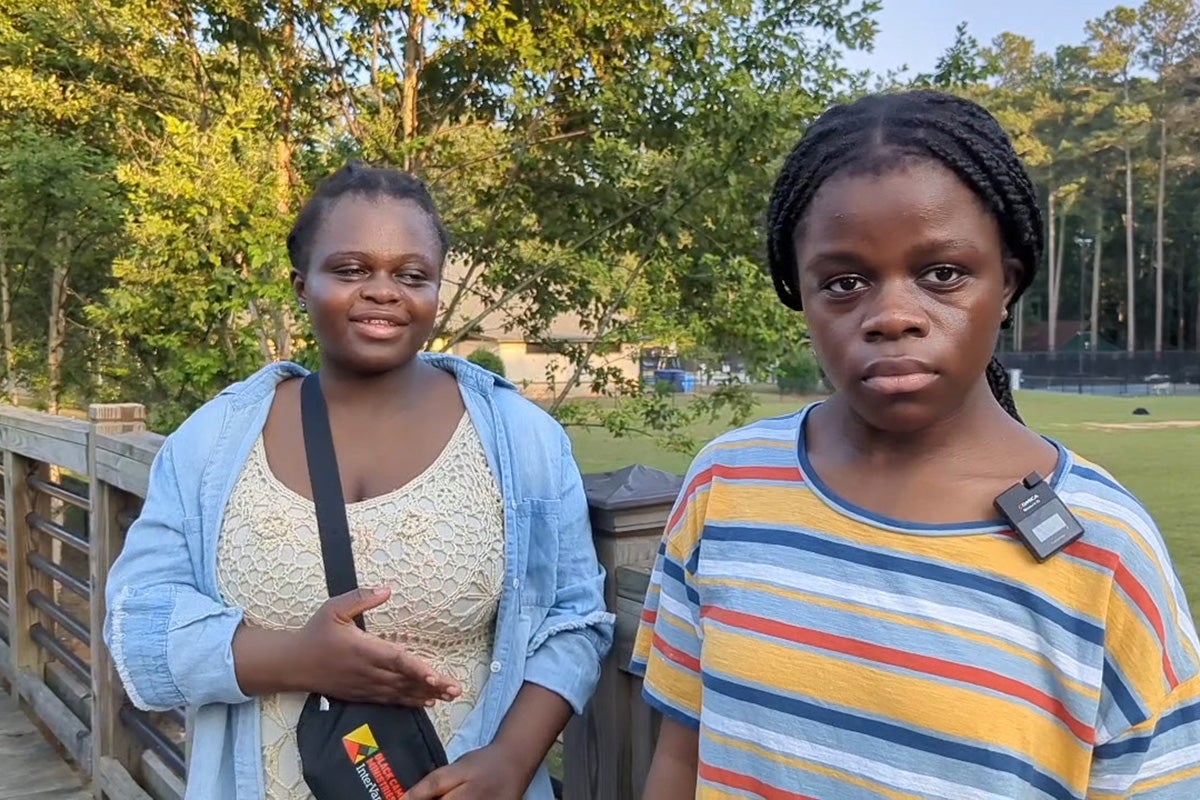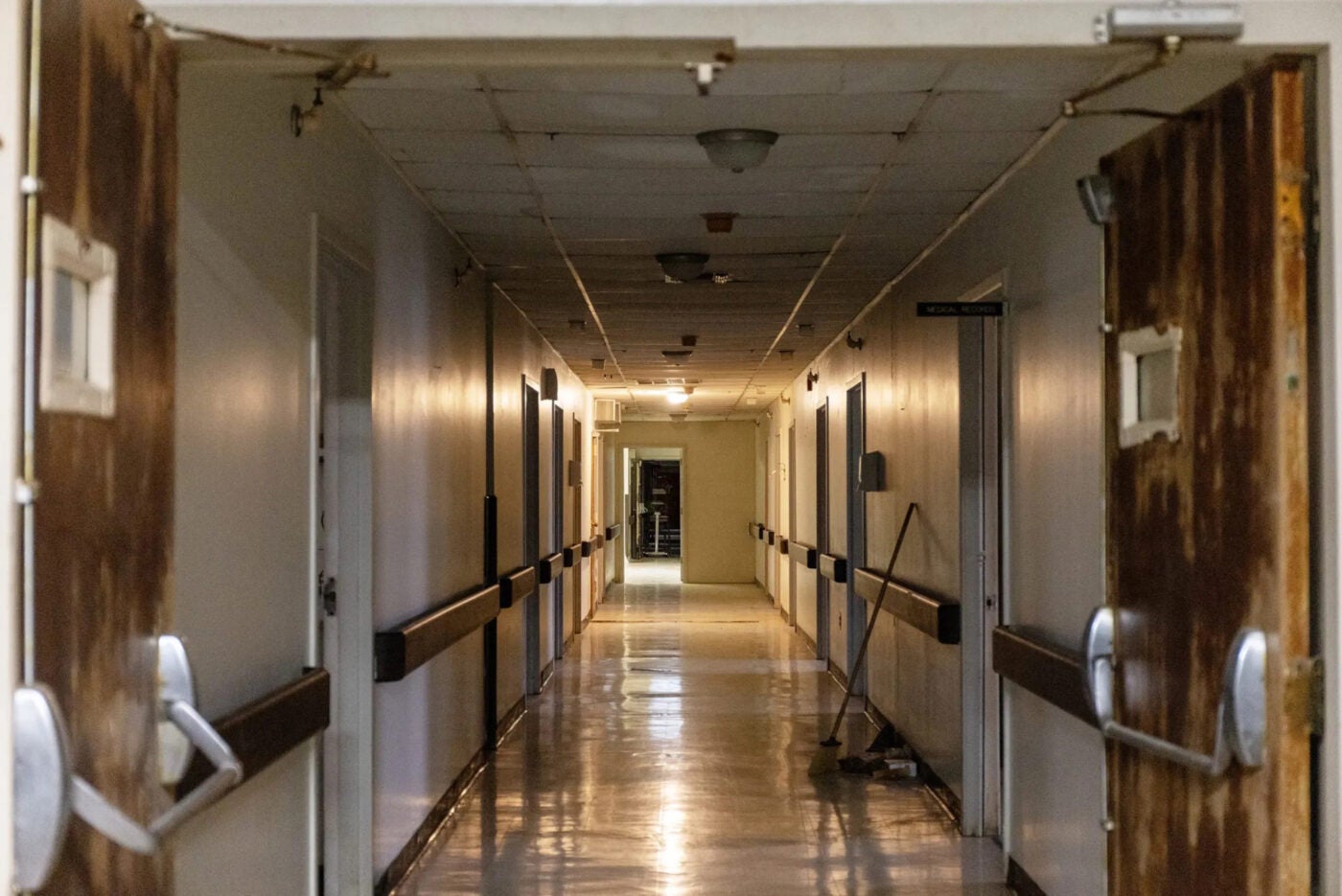
Feature
A small town struggles to survive losing its only hospital
This story was originally published by Mississippi Today and Public Health Watch.
Deep in a crumbling building in Belzoni, Mississippi, there is a room filled with folders.
Just a sliver of the room’s walls peek over the top of the manila piles. There are too many folders to count, with thick stacks of documents inside them, containing precious, forgotten information about a forgotten community, a community once cared for in this very building.
The only hospital in Belzoni, Patients’ Choice Medical Center of Humphreys County, closed in 2013. Besides the piles of paper, this building is empty, and the town is following suit. In the decade since the hospital’s closure, Belzoni has suffered.
Belzoni calls itself the “heart of the Delta” because of the town’s central location—people driving to various places in the region must pass through Belzoni, particularly those coming from Jackson.
After driving over the last hill just north of Yazoo City, U.S. Route 49 opens up into the Delta’s vast fields of green, leading straight to the city of Belzoni, just a speck flying past on the right. If you blink, you’ll miss it.
But to miss it would be to miss one of the rural communities that comprise the beating heart of Mississippi.
Rural towns, where the majority of Mississippians make their lives and homes, are often powered by hospitals that provide health care and jobs that sustain small but significant economies. When these small-town hospitals like Belzoni’s close, it can be devastating to so many people.

Patient records held at the former Patients’ Choice Medical Center of Humphreys County in Belzoni, Mississippi
Photo: Eric J. Shelton/Mississippi Today
It’s not just a loss of health care—economies collapse, as does a sense of safety. Almost everyone in Belzoni seems to have had a near-death experience, or a family member who has had a near-death experience, since the hospital closed. The nearest hospitals are at least a 25-minute drive away.
And not all citizens suffer equally.
In the Delta, the power dynamic and wealth gap between Black and white residents borne out of a history of slavery and Jim Crow laws are still prevalent. Poverty, race, and health are inextricably connected.
Belzoni’s story may be the future of other small towns in Mississippi. Nearly half of the state’s rural hospitals—just like the one that shuttered here—are at risk of closure.
Sign up for Harvard Public Health
Delivered to your inbox weekly.
Most Mississippians support Medicaid expansion. Ample national and state research shows that the policy is financially beneficial, and medical experts have said for years that it would help Mississippi’s hospitals and residents. But Gov. Tate Reeves continues to vehemently oppose the policy.
Meanwhile, hospital closures loom across the state, due in large part to huge uncompensated costs from caring for uninsured Mississippians. The Delta, the sickest region of the state, is in particular danger.
At least 12 hospitals, including long-term care facilities, besides Patients’ Choice have closed since 2008, according to the Mississippi State Department of Health.
But the impact of Medicaid expansion goes beyond financial viability for hospitals—it means making health care accessible for more people. As of 2019, 8.9 percent of people in Humphreys County were uninsured and would qualify for coverage if Medicaid was expanded, the highest rate of any county in the Delta and tied for the fourth-highest rate in the state. That’s slightly less than half of the total population of uninsured adults in Humphreys County. Statewide, an additional estimated 200,000 to 300,000 people would qualify under Medicaid expansion.
The lack of a hospital didn’t stop Emily Donovan from moving to Belzoni from Vicksburg in 2015. Her love of the lush Mississippi Delta and small-town life outweighed her concerns. After all, growing up in rural Mississippi, she was used to driving at least half an hour to get to the closest hospital.
But now, almost a decade and two kids later, Donovan is worried about her family and the vitality of her community.
She and her husband, who own an internet and phone cable business, have been turned down by prospective hires because of the lack of emergency care in Belzoni. And Donovan is the executive director of the county’s economic development board. It’s hard to do her job—boosting the town’s economy—when there’s no hospital for 25 miles in any direction.
Though Donovan estimates about a dozen businesses have opened in Belzoni since she moved there, an even greater number have closed.
“When you don’t have a hospital, businesses don’t usually want to come into a community,” she said.
As Donovan’s kids grow up, the issue also hits closer to home.
At a sleepover Donovan’s son hosted at her house a few months ago, he and his friends climbed up on the roof in a fit of boyish play during the night. When Donovan’s husband realized where the teenagers were, he hollered up to them, “We don’t have a hospital anywhere near here, so y’all need to get down!”
“What are you going to do in the middle of the night?” Donovan asked one afternoon in November, lines of motherly worry creasing her forehead.
A number of people in Belzoni could tell her the answer: Drive like hell and hope you make it.
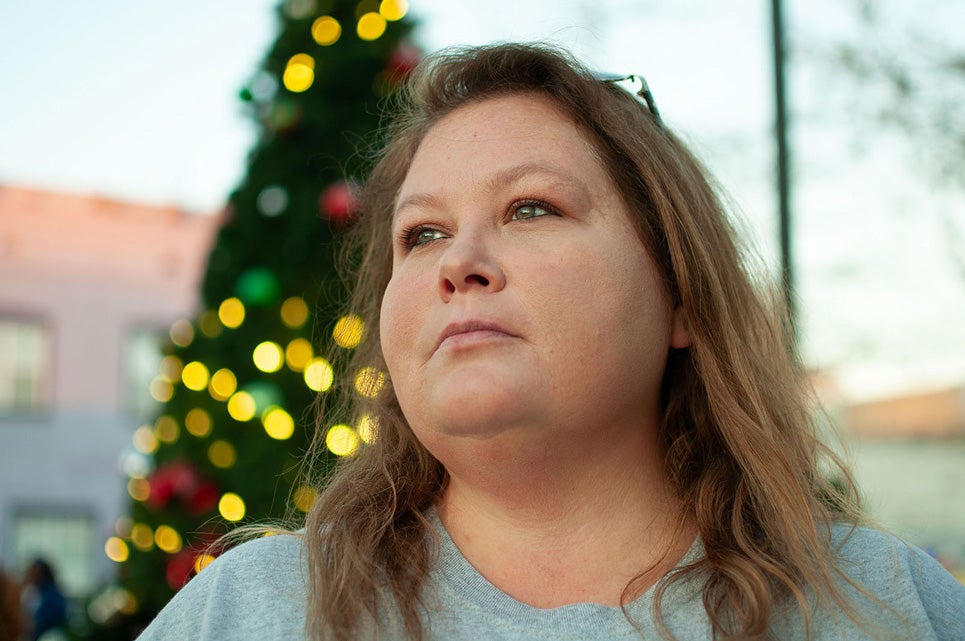
Emily Donovan, president of the Belzoni Humphreys Development Foundation, at the Christmas Farmers and Crafters Market in Belzoni, Mississippi in December.
Photo: Devna Bose/Mississippi Today
A bell jingles as Mayor Joe Jackson opens the door and shuffles into a restaurant a few steps away from City Hall.
“Hey, mayor,” the owner behind the counter says, while others murmur their greetings to him.
Many of the patrons have known Jackson for a long time, long before he was elected mayor in 2020. He was born and raised in this community, like many of them. Belzoni is that way—a town where there are no strangers.
It’s a rainy day. Jackson orders gumbo, looks out of the window and starts a story.
“Our small town hospital didn’t offer a whole lot,” he begins. “But it was something.”
Jackson was born in Belzoni by a midwife in 1960, the same year his hometown reached a population peak of 4,071 residents.
Though the town’s population had been dropping for decades, three strikes hit the town in the latter half of the century. First, the factory operated by retail company Jockey and employing at least 300 people closed in 1993.
Then, Belzoni’s largest industry was devastated. Once called the world’s catfish capital, the town couldn’t keep up with the rise of imported fish. Belzoni is hesitant to let go of its moniker—painted catfish sculptures still leap from its sleepy downtown sidewalks—but the days of leading in catfish exports are well behind them.
The final nail in the coffin was the hospital closure in 2013.
“When the hospital closed, it was kind of a surprise to most people,” Jackson said. “It was almost like they were open one week, and then closed the next week.”
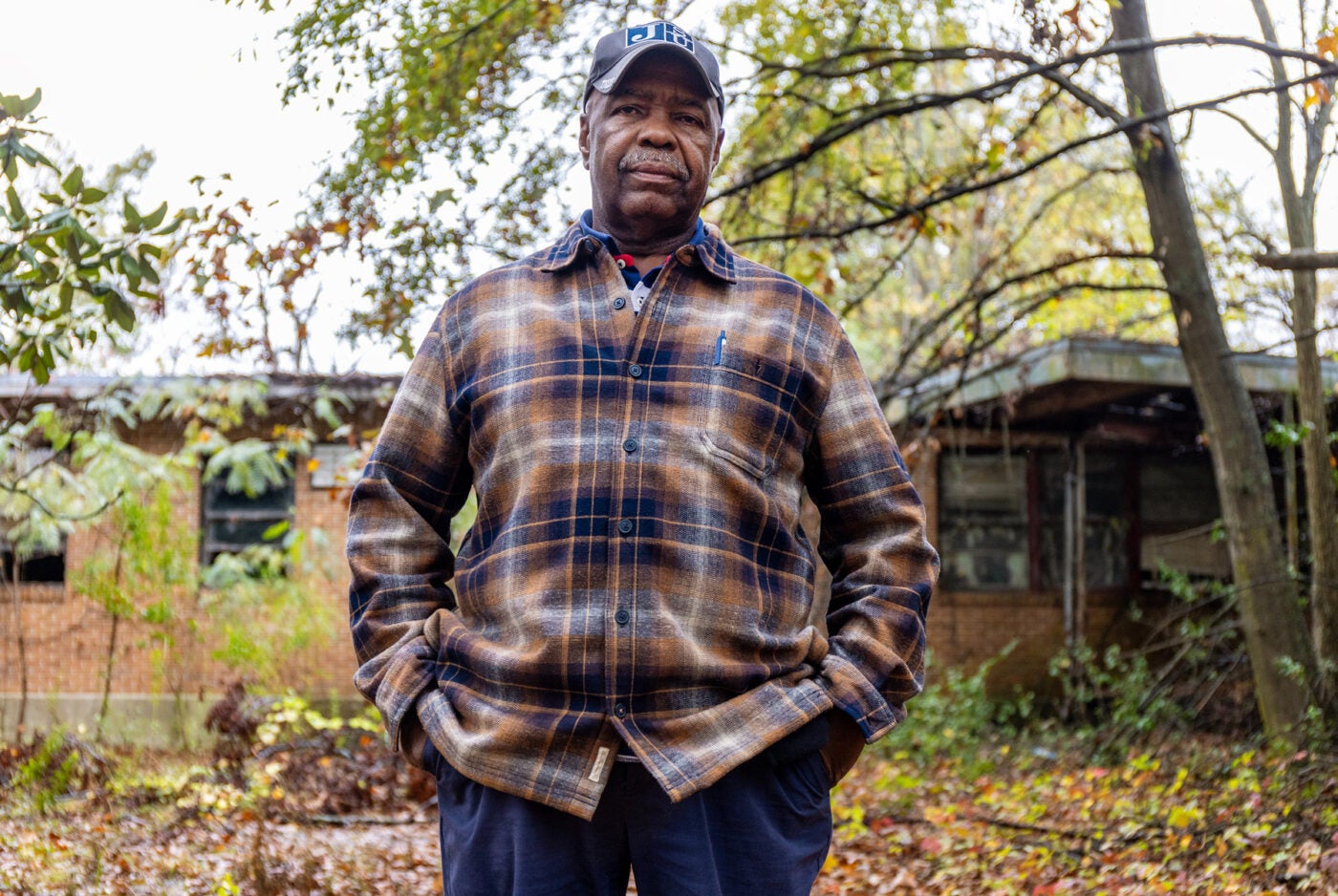
Joe Jackson was born in Belzoni in 1960, the same year the town’s population peaked. He was elected mayor the same year the population reached a 100-year low.
Photo: Credit: Eric J. Shelton/Mississippi Today
At first, residents, including Jackson, were hopeful the hospital would reopen. He had worked at the hospital for 20 years as an EMT, from 1985 to 2005. It seemed unfathomable to him that the hospital would close for good.
At the time of its closure, rumors were flying about hospital mismanagement—it seemed like most people hoped that new leadership could reopen the facility and turn the hospital around, Jackson said.
But months went by.
Suddenly, there just seemed to be fewer people in town. Some of the hospital’s 100-plus employees left Belzoni, and those who didn’t had to at least find jobs elsewhere.
“There were people in town every day because they worked at the hospital,” he said. “Now, they’re working out of town, so even the restaurants and stuff around town failed … downtown got a lot quieter.”
Despite repeated requests for data about city revenue, the city clerk never provided any information. State data shows, though, that Belzoni has collected less and less in sales tax since the hospital closed. In 2013, the city’s share of sales tax was $536,960. Ten years later, despite inflation, it’s down to $461,588.
Jackson has seen the hospital issue from all sides: as a longtime citizen, as a former hospital employee and now, a town leader. No matter how you look at it, he said, Belzoni is a shell of its former self.
“You can’t really convince people to move to a small town that does not have a hospital,” he said. “It just breaks your heart.”
In 2020, the same year Jackson was elected mayor, Belzoni’s population dropped below 2,000 for the first time in a century.
“You can’t really convince people to move to a small town that does not have a hospital.”
Joe Jackson, mayor, belzoni, mississippi
Five men sit at a table in a stuffy room on the top floor of the Humphreys County courthouse.
At the center is Humphreys County Board of Supervisors president Richard Stevens, known to most as just “Dick” or “Dickie.” Stevens, the sole white person on the board, is flanked by the other four supervisors.
All eyes are turned toward them and the woman Stevens is currently in a screaming match with, Timaka James-Jones, the county’s circuit clerk.
One hour into the board of supervisors meeting on Nov. 6, a discussion about county affairs has devolved, but no one seems particularly surprised.
This sort of thing isn’t uncommon in a county where the gaps between members of the community are so wide and deep.
People who live in Belzoni don’t agree on why the hospital closed and whether it’s had an impact on the town’s economy. Even its leaders can’t reach a consensus on the hospital. And for some of the town’s residents, these meetings are the easiest way to be heard by the five men who make decisions for them all.
Stevens is perhaps the most powerful man in Humphreys County.
He was the board’s longest serving member until his retirement in December, and the owner of the county’s largest employer, Consolidated Catfish Co., located just a few miles north of Belzoni in a pinprick of a town called Isola.
Stevens and Roy Broomfield, who also retired at the end of last year, were the only two board members serving in December who were also on the board when it voted to sell the hospital to a private owner, Ray Shoemaker, a few years before its closure.
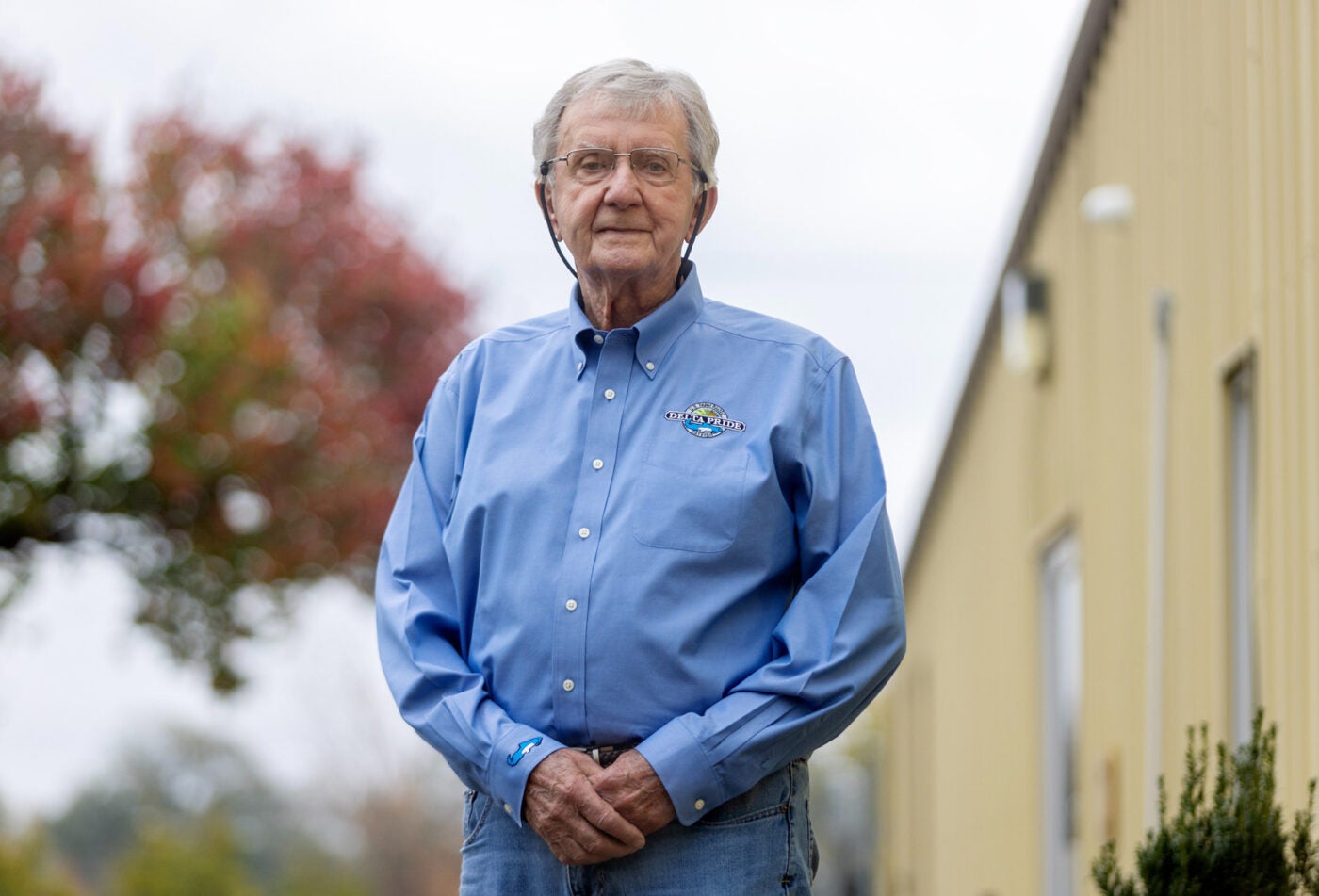
Richard Stevens was the longest serving member on the Humphreys County Board of Supervisors until his retirement in December.
Photo: Eric J. Shelton/Mississippi Today
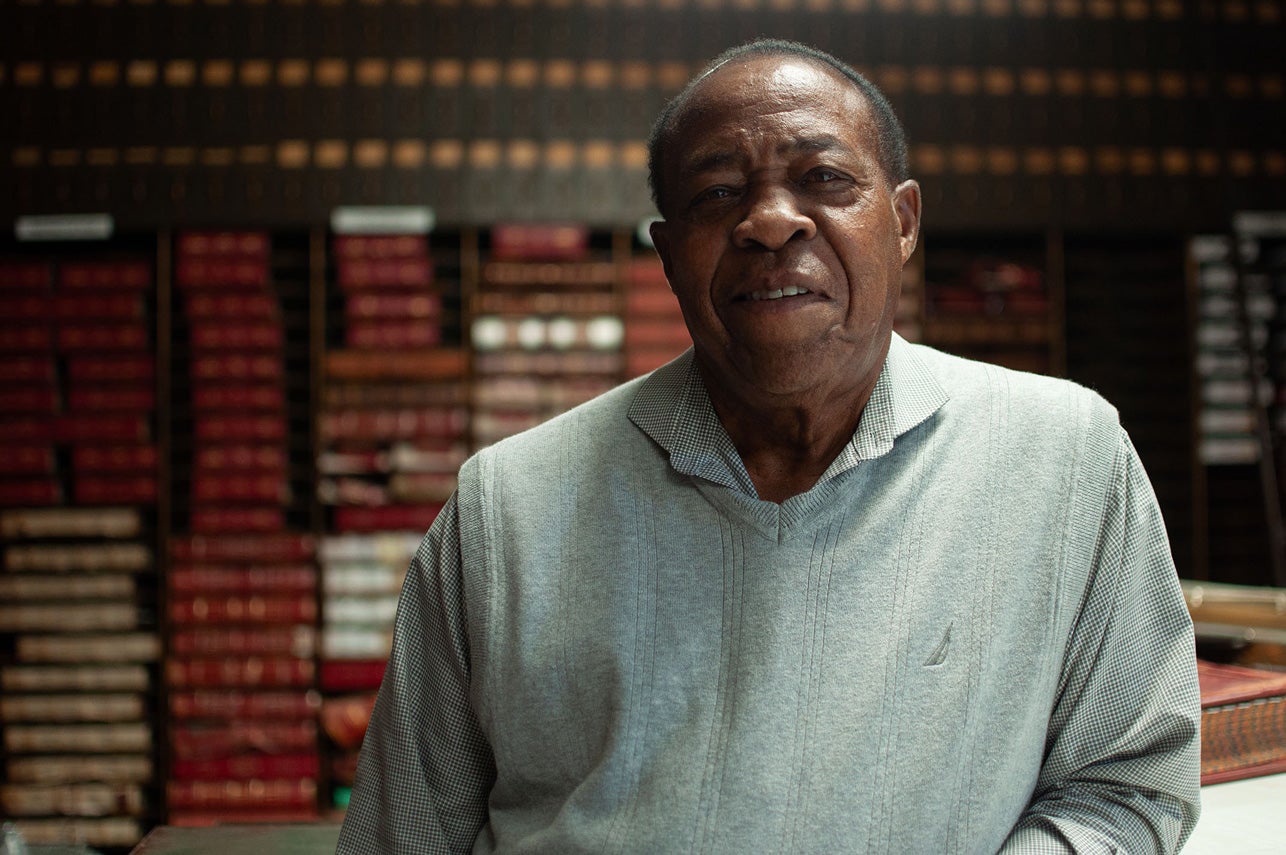
Roy Broomfield, whose son died in the car on the way to the hospital, is pictured inside the Humphreys County Courthouse in Belzoni, Mississippi, on Wednesday, Nov. 15, 2023.
Photo: Devna Bose/Mississippi Today
However, the two long-serving board members have differing ideas about how important a hospital is to Humphreys.
Stevens has lived in Humphreys County since 1949. He was 6 when his family moved from Tremont, a small town in north Mississippi near the Alabama state line. His father was a crop duster, so instead of flying back and forth every summer, the Stevens patriarch made the move permanent.
Stevens started farming catfish in the late 60s, and his plant, a result of two merged catfish processors, has been around for decades. The company processes more than a million pounds of catfish every week, and it employs around 600 people, who are some of the only people in Humphreys County with health insurance, Stevens said.
He decided to run for the board seat 24 years ago because he wanted to protect the county’s economic vitality.
However, two decades later, one of the town’s biggest economic drivers is closed, according to the mayor and other city leaders.
Stevens doesn’t see it that way. He said the hospital had been losing money for a long time, and it wasn’t even doing its job that well.
“It wasn’t comparable to nearby hospitals,” he said.
Stevens complained that residents were misusing the emergency room, treating it like “free” primary care.
Though there are two health clinics in Belzoni that offer primary care, emergency rooms are the only health care option for many uninsured people because they cannot turn away patients, regardless of insurance status. There are few, if any, primary care or preventative care options for people without health insurance—the hospital was likely their only option.
By the time the board of supervisors sold the hospital, it was millions of dollars in the hole, Stevens said. He hoped Shoemaker would be able to turn things around but doesn’t consider it much of a loss that he ended up being unable to.
“I think he did what he could do to make it work,” Stevens said, placing much of the blame on Belzoni’s already-slowing economy, which he doesn’t think the hospital’s closure significantly affected. “There were many negative factors.”
Stevens is, at best, resigned and, at worst, indifferent: “It’s just the way of life here.”
Dr. Sidney Gorton II feels similarly. He and his father are the only two full-time doctors in Belzoni. They run a family rural health clinic in Belzoni, and both used to work at the hospital.
He agreed with Stevens that misuse of the emergency room was one of the things that led to the hospital’s decline. The hospital’s inpatient census was always pretty low, too, he remembers, and when patients did have Medicaid coverage, low reimbursements rates didn’t cover hospital expenses.
But the doctor said he was not sure that Medicaid expansion was the solution to Belzoni’s health care desert, and that issues leading to the hospital’s closure were more far-reaching.
Broomfield’s recollection is a little different—and much more painful.
While Broomfield, who’s been on the board for two decades, agrees that perhaps Belzoni didn’t have the population or dollars in the community to sustain the hospital, he believes the lack of emergency care in Belzoni is dangerous. He knows it’s dangerous.
Because even Broomfield, another powerful and well-known Belzonian, isn’t immune to the effects—he lost a son to lack of health care in the Delta a little over a decade ago.
It was supposed to be a happy occasion.
Back in 2010, Broomfield’s son, 39-year-old Roy Jr., was home visiting his parents. He lived states away in Dallas, and Broomfield was thrilled to have his son in town.
But at about 2:30 a.m., Broomfield’s son woke him up, complaining about feeling sick. His father guessed it was indigestion or something similar, but thought they should go to a hospital anyway, just to be safe.
Broomfield figured they had a little time, so he didn’t take his son to Patients Choice, which had a reputation as a declining hospital at that point, referred to as the local “Band-Aid station.” So Broomfield decided to take him to Greenwood Leflore Hospital, a little over 30 minutes away.
On the way, his son suffered a massive heart attack. An ambulance Broomfield called never arrived, and the son was brain dead before they reached the Greenwood hospital.
Broomfield has regrets—he always will. But at least he had the option to take his son somewhere closer.
“At least we had a place to go to get a Band-Aid put on,” Broomfield said. “Now we don’t even have that. A lot of people’s lives could have been saved if we had a hospital here.”
The circuit clerk, James-Jones, shares Broomfield’s perspective, as do many Black leaders in town. James-Jones grew up with Broomfield’s son, and she was born at what was then-Humphreys County Memorial Hospital.
Not only was the hospital a huge employer, James-Jones said there were also impactful community advocacy programs being run by the hospital. In her eyes, the hospital was central to the community.
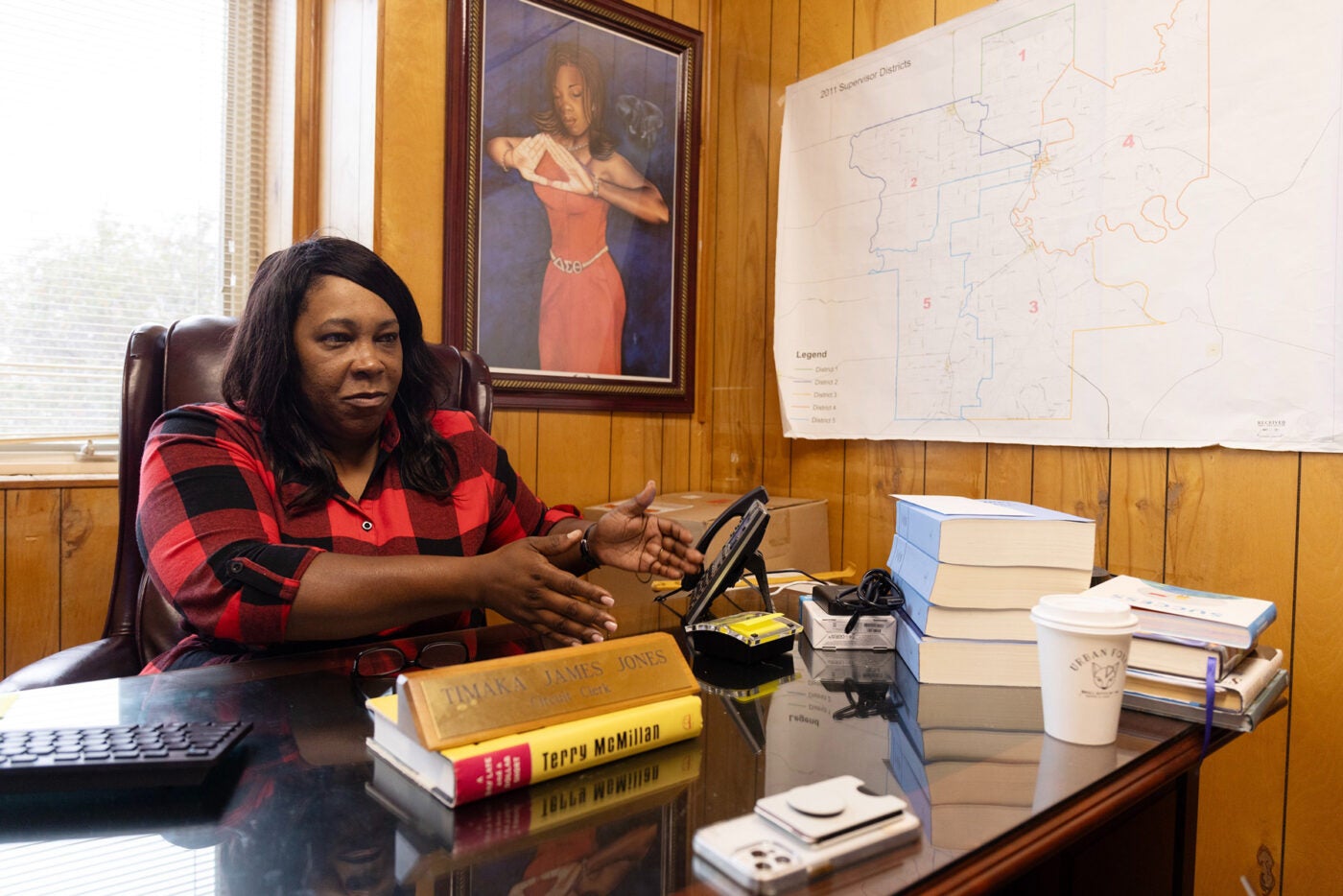
Timaka James-Jones, member-elect of the Mississippi House of Representatives for District 51, talks about the lack of medical care in Belzoni while in her office at the Humphreys County Courthouse in Belzoni on Friday, Nov. 17, 2023.
Photo: Eric J. Shelton/Mississippi Today
That’s why James-Jones, who was recently elected to the state House of Representatives, isn’t afraid to speak her mind to the board and fight in public with its leader. She has suffered immense loss—friends and family—from the lack of emergency care, which she directly attributes to the board’s actions. One of the most well-known examples is the death of one of her relatives, Harmony Ball-Stribling.
Everyone in town seems to know Harmony’s story, every grisly and heart-wrenching detail.
During the summer of 2021, Harmony was days away from giving birth when she began experiencing pregnancy complications as a result of preeclampsia, a condition that results in high blood pressure and organ damage.
Her husband, Byron Stribling, raced her to the hospital in Yazoo County. Harmony was his high school sweetheart, the love of his life. She was pregnant with his first child, a baby they had tirelessly prayed for and underwent an arduous in vitro fertilization process to conceive.
But before they arrived at the hospital, Harmony went into cardiac arrest in the passenger seat. Byron, who operates a funeral home, buried his own wife and baby days later.
After her death, Harmony’s mother, Shenelle Ball-Burks, and Byron implored the board of supervisors to figure out how to reopen the Belzoni hospital. Harmony’s mother remembers how defeated she felt when the supervisors told her there was nothing they could do.
James-Jones says the hospital closure is “the most devastating thing that has happened” in Humphreys County.
Amid the competing opinions and recollections of the demise of Belzoni’s only hospital, one of the few people who should be able to explain the hospital’s closure isn’t keen on providing many details.
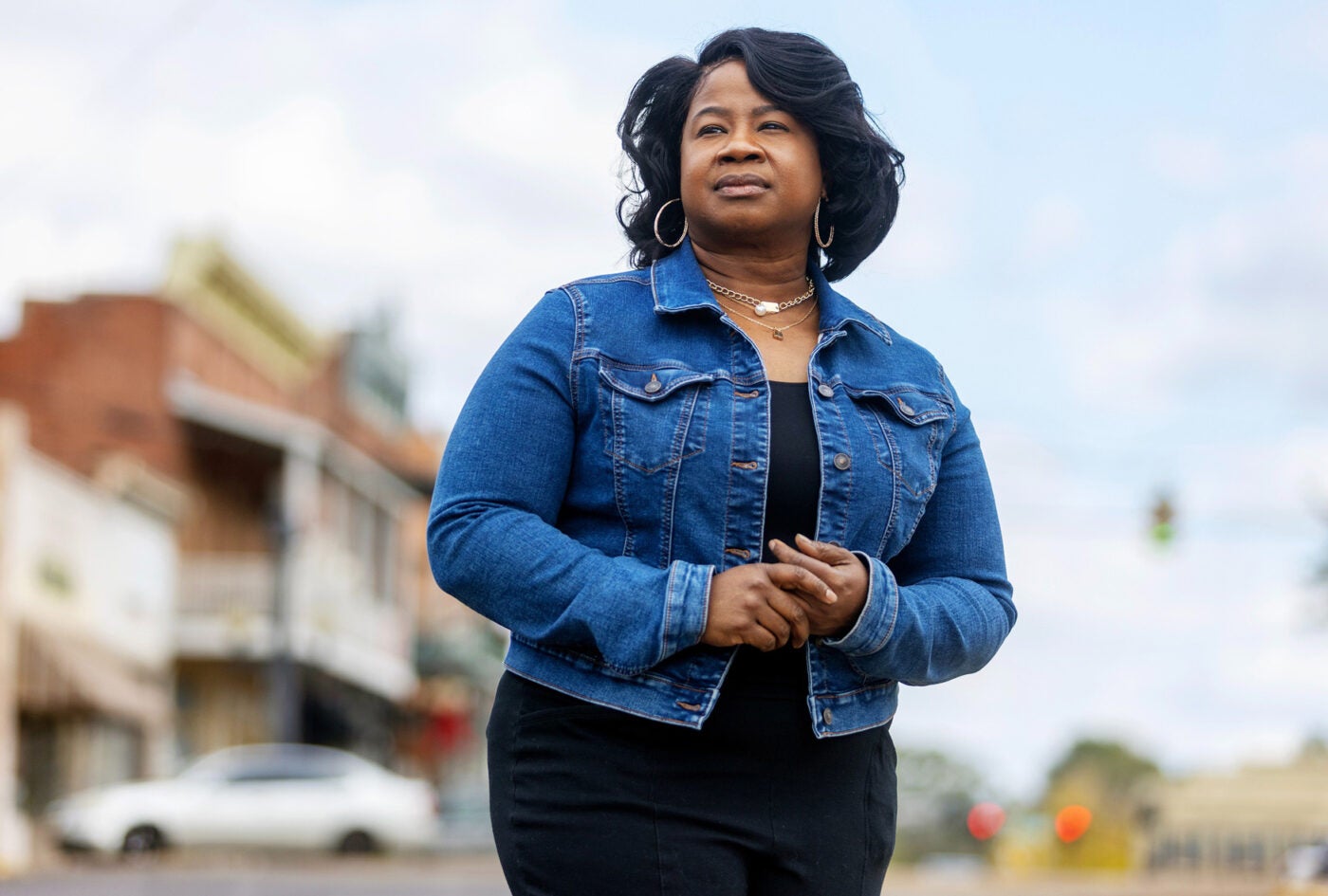
After her daughter, Harmony Ball-Stribling, died on her way to a hospital in Yazoo, Shenelle Ball-Burks implored the board of supervisors to figure out how to reopen the Belzoni hospital.
Photo: Eric J. Shelton/Mississippi Today
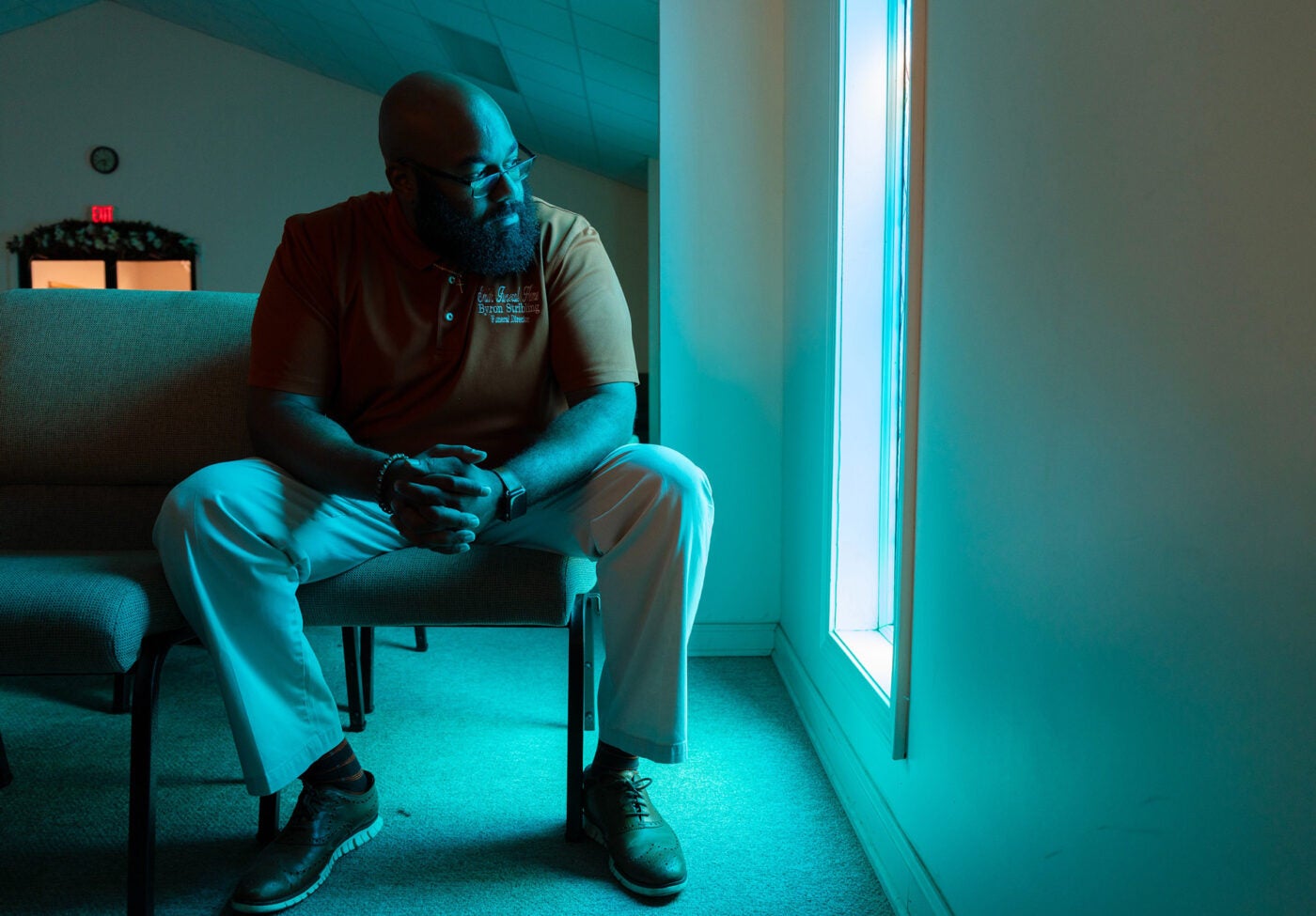
Byron Stribling tried to rush his wife, Harmony Ball-Stribling, to a hospital in Yazoo County after she experienced pregnancy complications. Before they arrived at the hospital, Harmony went into cardiac arrest.
Photo: Eric J. Shelton/Mississippi Today
Much of what happened with the hospital is lost to time, thanks to a specific kind of small-town Kafkaesque bureaucracy.
No one can say where the hospital’s financial reports are. The county’s board attorney, state Rep. Willie Bailey, didn’t know where they would be and said the county wouldn’t be in possession of them, if they even still existed. He suggested the hospital board might still have them.
But the hospital board is, obviously, disbanded. Several of its previous members have died in the past 10 years.
Even Mack Liddell, the Humphreys County chancery clerk since 2020, couldn’t say where the records were.
“Those records are not in my care at this time,” he responded to Mississippi Today’s records request.
Liddell said his predecessor had taken a great number of county records “home with him” when he left office, and then promptly died, too. Perhaps the records are somewhere in that man’s house, or they’re in one of the many manila folders in the run down hospital building that sits on the edge of town.
One would think that Ray Shoemaker, the hospital’s last owner, would have all the answers, but it doesn’t seem like he particularly wants to talk about the hospital’s decline.
After all, Shoemaker was sentenced to 55 months in federal prison in 2012 for multiple counts of health-care fraud, most of the malfeasance related to another hospital he ran.
“I don’t want my story played again,” he said when reached by phone.
Though hesitant to talk, he explained that he became interested in owning the hospital because he grew up in Walnut Grove, another small town in east central Mississippi, and recognized the need for rigorous health care in the state’s rural communities.
When the board of supervisors heard Shoemaker was interested—he was being lauded then for turning around Tri-Lakes Medical Center in Batesville—they jumped at the opportunity. Shoemaker took over the Belzoni hospital’s management in 2007, and a year later, he bought the 34-bed hospital outright, taking on its $5.4 million in debts.
When asked what made him think he could turn the hospital around, Shoemaker joked, “Insanity.”
He went on to take charge of several other hospitals across the state. Shoemaker says he reduced the Belzoni hospital’s debt and increased its services by sharing resources among his facilities.
Then in 2012, Shoemaker was prosecuted for health care fraud committed at the Batesville health center.
Despite purported strides at the Belzoni hospital, when Shoemaker started experiencing “legal challenges,” as he puts it, the facility was suddenly in danger. He could no longer manage the hospital’s daily operations.
Inspection reports show that the hospital faced difficulties in its final years, even before Shoemaker took over.
Apparently, record-keeping has long been a struggle for the facility. Since 2007, state evaluators have been taking issue with the unorganized mountains of records stored in the hospital. In December 2012, “the administrator stated that he could not find documentation that the facility had conducted an annual evaluation of its total program during the past year,” according to one inspection report.
The reports show that by July 22, 2013, Patients Choice was no longer in operation.
As it turns out, Shoemaker can’t speak to the hospital’s final days. He was in prison.
When asked what made him think he could turn Patients’ Choice Medical Center around, Shoemaker joked, “Insanity.”
Joann and Joseph Wilson walk through the dark halls of the dilapidated hospital building.
The ceilings are falling in, and there’s graffiti on the walls. There are rooms upon rooms of documents. But they think the building still has some life in it.
The old hospital was recently bought by an investor who has partnered with the Wilsons to turn the building into a clinic for people struggling with mental health issues and substance abuse.
For Joseph, the project holds special meaning—his life was saved at the Belzoni hospital when it was in operation. He was rushed here in 2008 because he slipped into a diabetic coma, and doctors in the emergency room stabilized him.
“If this facility had not been here when I was sick, I might not be alive today,” he said.
The Wilsons say they’re open to allowing someone to open an emergency room in the clinic building. They agree it’s a major need for the community.
Several people who mourn the loss of the hospital have cited efforts in recent years to reopen an emergency room in Belzoni.
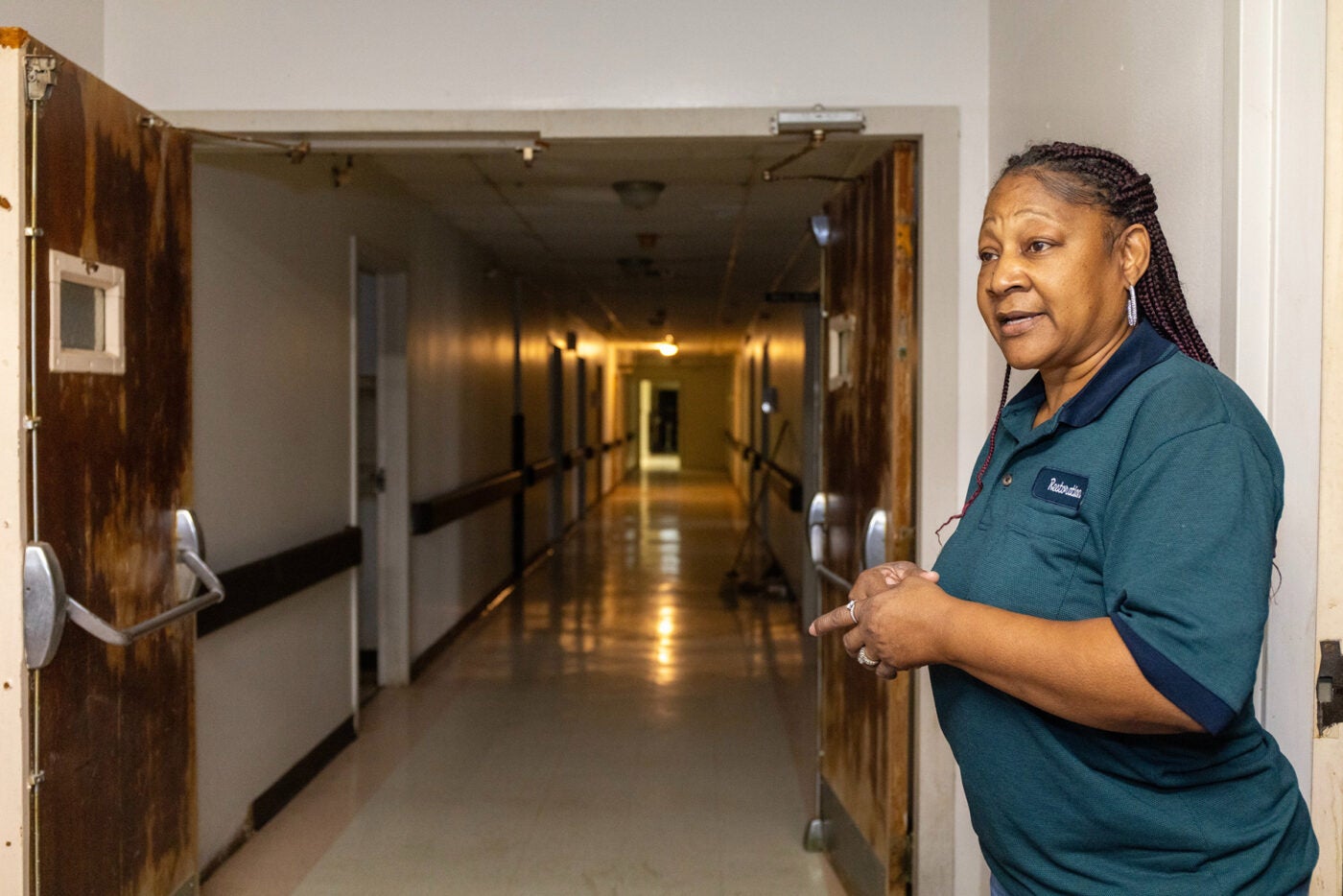
Joann Wilson gives a tour of the former Patients’ Choice Medical Center of Humphreys County in Belzoni, Mississippi, on Friday, Nov. 17, 2023.
Photo: Eric J. Shelton/Mississippi Today
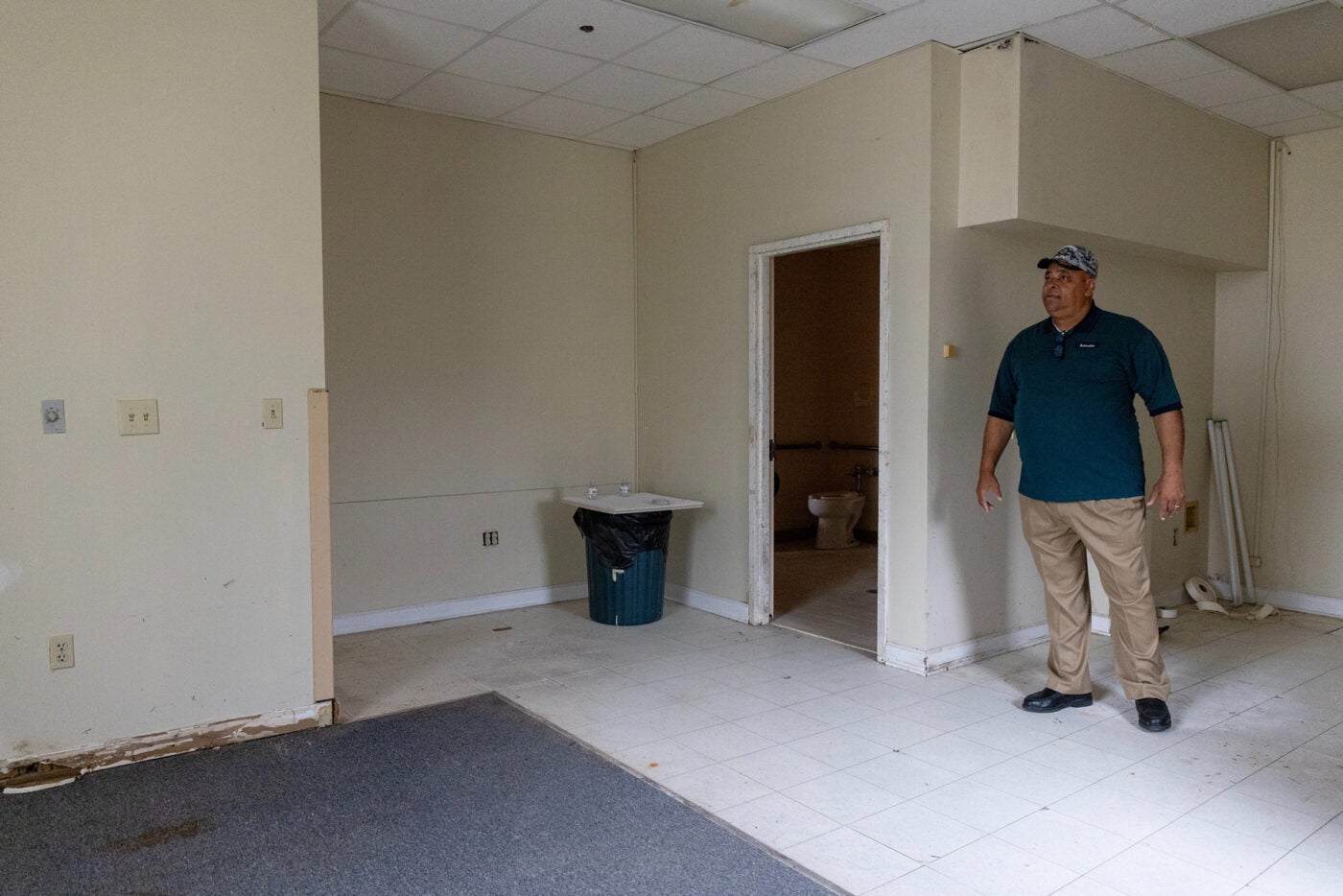
Joseph Wilson gives a tour of the former Patients’ Choice Medical Center of Humphreys County in Belzoni, Mississippi.
Photo: Eric J. Shelton/Mississippi Today
As mayor, Jackson has met with countless politicians and health care leaders to bring back emergency care in Belzoni. It’s hard to see any kind of future for the town without it, he said. James-Jones and Liddell, the chancery clerk, have been invested in this effort, too.
The efforts went as far as a packed town hall, where prolific hospital owner Quentin Whitwell spoke about new legislation that might have made it possible to reestablish emergency care in Belzoni.
Senate Bill 2735, passed during the 2022 legislative session, was created in an effort to operate freestanding emergency rooms in rural Mississippi. But ultimately, according to Whitwell, “The law wasn’t sufficient to get that accomplished.” No county has gotten an emergency room from this legislation, according to the state Health Department.
The bill’s principal author, Sen. Benjamin Suber of Bruce, said the legislation was an attempt at getting health care to parts of the state that needed it most, but admitted that he wasn’t sure if “it was gonna work or not.”
Suber did not know that Whitwell considered the bill flawed.
“No one’s ever told me that, but we can do what we can to amend it,” he said. “If we needed to fix something, I would fix it. But that’s the first time someone’s ever said that to me.”
It was news to many residents that this law would not result in an emergency room in Belzoni. They had been waiting for years.
Liddell was one of them surprised by the update.
“This is hurtful,” he said. “Until the governor and every ally associated with him believes that the Delta is worthy of health care or other vital services … It doesn’t matter what color you are. You are a human being, and one day you’re going to get sick.”
Belzoni’s sons and daughters who moved elsewhere know that. The ones who stay, such as Byron, know that. The businesses that choose to establish themselves elsewhere know that. Broomfield, the county supervisor who lost his son, knows it, too.
But after years of feeling like the state doesn’t care about his home, Broomfield doesn’t know what to do.
“The Legislature, they don’t do anything for the Delta,” he said. “They just don’t care nothing about us.”
There’s something different about downtown Belzoni on an afternoon in early December: Specifically, noise.
A hum emanates from the center of town, where a towering Christmas tree, framed by a citrine Delta sunset, overlooks 5 p.m. traffic. For Belzoni, that means just a few more cars on the street than usual.
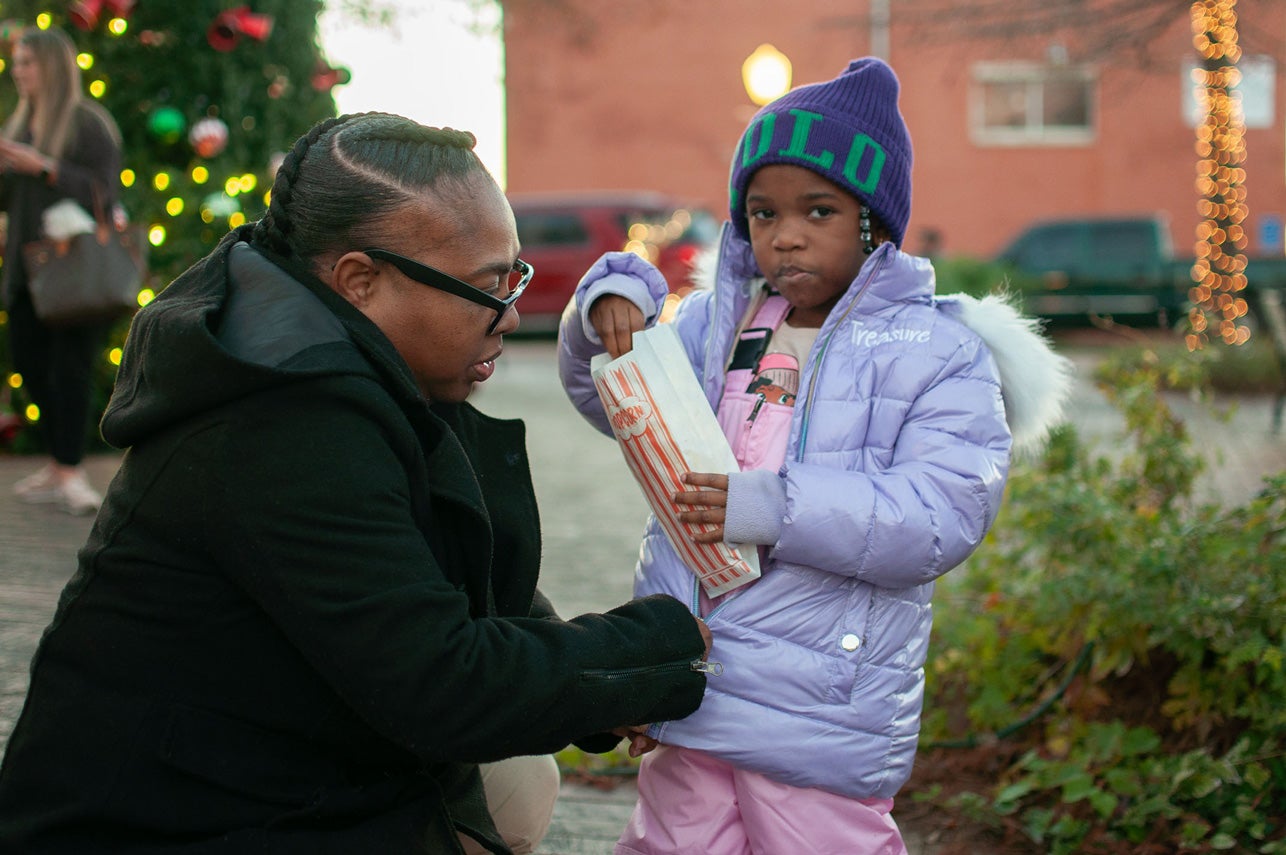
Tiffany Ceasar zips up 5-year-old daughter Treasure Dulaney’s coat at the Second Annual Christmas Tree Lighting in Belzoni, Mississippi, on Monday, Dec. 5, 2023.
Photo: Devna Bose/Mississippi Today

One-year-old Mary Tatum Pearson explores decorations at the Second Annual Christmas Tree Lighting in Belzoni, Mississippi, on Monday, Dec. 5, 2023.
Photo: Devna Bose/Mississippi Today
Emily Donovan, the economic foundation director, is bustling about, setting up tables and greeting guests at Belzoni’s Second Annual Christmas Tree Lighting and Farmers Market.
State Rep. Timaka James-Jones is here, too, talking to longtime neighbors and friends. Vendors are selling local wares, such as Southern chow chow relish and a variety of pickled vegetables. Kids are chasing each other, breaths like little clouds in the cool evening air.
This is the Belzoni that Donovan knows and loves. This is the Belzoni that Donovan wants to see survive.
Five-year-old Treasure Dulaney is one of the many children staring up at the Christmas tree in awe. Her mom, Tiffany Ceasar, a lifelong Belzoni resident, didn’t think twice about raising her family in Belzoni. It’s home.
But before Treasure can go play with the other kids, Tiffany crouches down and zips up her daughter’s jacket.
She’s always been prone to colds, and with no hospital in town, Tiffany doesn’t want to take any chances.
Top image: An empty hallway inside the former Patients’ Choice Medical Center of Humphreys County in Belzoni, Mississippi, on Friday, Nov. 17, 2023. Photo: Eric J. Shelton/Mississippi Today
Mississippi Today is a nonprofit, nonpartisan, digital-first newsroom serving Mississippi and meeting the information needs of communities across the state.
This story is part of “The Holdouts,” a reporting collaborative focused on the 10 states that have not expanded Medicaid, which the Affordable Care Act authorized in 2010. The collaborative is a project of Public Health Watch.

